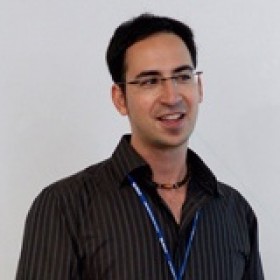Source Constrained Clustering
Abstract: We consider the problem of quantizing data generated from disparate sources, e.g. subjects performing actions with different styles, movies with particular genre bias, various conditions in which images of objects are taken, etc. These are scenarios where unsupervised clustering produces inadequate codebooks because algorithms like K-means tend to cluster samples based on data biases [...]
3D Reconstruction of a Smooth Articulated Trajectory from a Monocular Image Sequence
Event Location: NSH 1507Abstract: In this talk, I will present a method to reconstruct an articulated trajectory in 3D given the 2D projection of the articulated trajectory, the 3D parent trajectory, and the camera pose at each time instant. This is a core challenge in reconstructing the 3D motion of articulated structures such as the [...]
Evolving the OpenGL Graphics Pipeline in Pursuit of Real-Time, Film-Quality Rendering
Event Location: NSH 1305Bio: Kayvon Fatahalian is an Assistant Professor in the Computer Science Department at Carnegie Mellon University. His research focuses on the design of programming abstractions and efficient parallel systems for computer-intensive applications such as interactive computer graphics.Abstract: In the past fifteen years the capabilities of real-time graphics systems have increased rapidly as [...]
Discovering Object Instances from Scenes of Daily Living
Event Location: NSH 1507Abstract: We propose an approach to identify and segment objects from scenes that a person (or robot) encounters in Activities of Daily Living (ADL). Images collected in those cluttered scenes contain multiple objects. Each image provides only a partial, possibly very different view of each object. An object instance discovery program must [...]
Feature Seeding for Action Recognition
Event Location: NSH 1507Abstract: Progress in action recognition has been in large part due to advances in the features that drive learning-based methods. However, the relative sparsity of training data and the risk of overfitting have made it difficult to directly search for good features. In this work we suggest using synthetic data to search [...]
Behavioral Correlates of Hippocampal Neural Sequences
Event Location: NSH 3305Abstract: Sequences of neural activity representing paths in an environment are expressed in the rodent hippocampus at three distinct time scales, with different hypothesized roles in hippocampal function. As an animal moves through an environment and passes through a series of place fields, place cells activate and deactivate in sequence, at the [...]
AI and Economics: The Dynamic Duo
Event Location: NSH 1305Bio: Ariel Procaccia is an Assistant Professor in the Computer Science Department at Carnegie Mellon University. His research interests include the (pairwise) intersections of AI, social choice, and game theory. He received his Ph.D. in computer science from the Hebrew University of Jerusalem, and was subsequently a postdoc at Microsoft and Harvard. [...]
Towards true autonomous mobility services in cities – A European view through INRIA experience
Event Location: 1305 Newell Simon HallBio: Fawzi Nashashibi, 45 years, is a senior researcher and the Program Manager of IMARA research Team at INRIA since January 2011. He has been senior researcher in the robotics centre of the École des Mines de Paris (Mines ParisTech) since 1994 and is an R&D engineer and a project [...]
Neural Mechanisms Underlying Contextual Associative Processing
Event Location: NSH 1507Bio: Elissa Aminoff received her Ph.D. from Harvard University in 2008 under the mentorship of Dr. Moshe Bar and Dr. Daniel Schacter. Her dissertation work focused on uncovering the neural mechanisms underlying contextual associative processing and the insights this provides in visual object recognition and memory related processing. From 2008 to the [...]
How Prototyping Practices Affect Design Results
Event Location: NSH 1305Bio: Steven is an Assistant Professor at the HCI Institute at Carnegie Mellon University where he researches human-computer interaction, creative problem-solving, prototyping practices, and crowdsourcing methods. He is recipient of Stanford's Postdoctoral Research Award and co-recipient of a Hasso Plattner Design Thinking Research Grant. He received an MS and PhD in Human-Centered [...]









